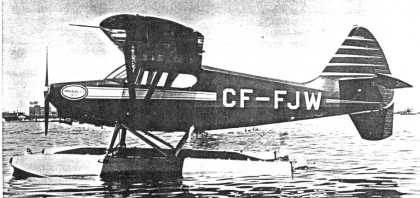Wordsmith of Africa
My Mother’s Lovers, Christopher Hope, 2006
Stinson 108 Pontoon

This is the story of a white South African boy, born during WWII, to a single non-maternal mother nearly widowed by three South African Air Force pilots. The mother is 6’2″ tall, a bush pilot and big game hunter, boxer of Ernest Hemingway, friend of Albert Schweitzer, colorblind and the collector of countless “uncles”, with a wanderlust that takes her flying throughout Africa leaving the son abandoned in a Johannesburg suburb.
Like some great schooner she skimmed over life, over lovers, over family, over Africa… She had simply sailed over the top of it, and so made good her escape… disdaining even to regard colour; she did Africa without doing race.
Flying Station Wagon

The son develops a wanderlust of his own when he grows up and he travels throughout Asia selling air conditioners.
On his grandfather’s decision to stay in South Africa rather than return to Ireland:
After blowing up half the Transvaal with his dynamite (mining and sabotage), he reckoned he’d made enough of an impression on the place to call it home.
Johannesburg Gold Mine

On the English who colonized South Africa:
‘You lot are bloody useless, can’t find work, can’t feed yourselves, can’t cross the street unaided. So here’s a free passage to Africa – where you can pretend to be important.’ So off we went, and the rest was history. We became marooned ex-sailors or failed farmers in a place where we were not prepared to work, or kill, with sufficient energy. We were never even a tribe: the best we managed was a kind of B-team. The sort of people who’d rather be murdered in our beds than make them ourselves.
On violence in South Africa:
But there is an old tradition in my country that some important truths can also be delivered by bullet. In essence it goes like this; if you come across something or someone you don’t like, then you shout; if that doesn’t work, then break something; and if the stupid bastards still refuse to be reasonable, start shooting.
About rule under Apartheid:
The guys in far-away Pretoria who ran our lives were just another gang pretending to be a government.
On South African intellectuals:
Generally, our intellectuals lived by proxy; they were like long-range radio receivers; their inspiration, their books, their films, and their language, their Marx and Fanon and Gramsci, their New Statesman and their African Communist, their pamphlets, posters, slogans and songs came from far away, picked up as faint signals mixed in with lots of static…If ideas didn’t come from there they were not worth knowing…
On the difference between colonialism in Africa and Asia:
The Portuguese, the Chinese, the Dutch, the British in Malaysia were powerful, yes, but somehow never insistent, and so the poison of their presence was less toxic than it was in Africa; from the peaks of their pride they looked down on the people of Asia but never did they assume they did not exist. In Africa they saw nothing human; they stripped it of its people, polished them off, not just with guns and germs but also by truly and honestly doubting they ever were truly alive, and so they became nothing.
On the Africanization of names after independence:
So the president, Joe Desire Mobutu, became ‘Mobuto Sese Seko Kuku NgBendu wa ZaBanga’ which roughly translates into ‘the all-powerful warrior who, because of his inflexible will to win, will go from conquest to conquest leaving fire in his wake.’
Do you know what Veseveete means in Herero? It means “Let them die for the good of the liberation…” Good revolutionaries always toss their kids into the bonfires of their good intentions.
Johannesburg Skyline

The son returns to South Africa as his mother, then in her eighties, is dying of cancer. In the rest of the novel, we are given a tour of post-apartheid South Africa. On AIDs in South Africa and the new rulers who think that Anti-retro viral (ARV) drugs are a plot from the West to kill Africans:
We were watching death by ideology. Koosie was dying, persisting in saying that he was not ill, in line with party dogma.